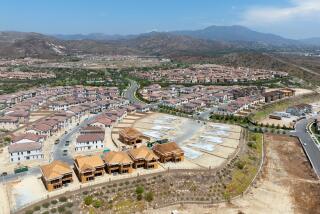Japanese Investors Turn From Offices to Retail, Residential
- Share via
Increasingly sophisticated Japanese real estate investors are leaving the office behind and heading for retail and residential markets in Orange County, according to a report released Thursday by Coldwell Banker.
Since last September, Japanese buyers have handed over almost $100 million for retail and apartment buildings in the county. And the figure is expected to keep rising, said Joe Leon, a Japanese investment specialist with Coldwell Banker, a major real estate brokerage.
For other real estate investors in Orange County, the result could be more competition for available properties. For the Japanese, the purchases mean a more diversified investment portfolio.
‘Starting to Get Smart’
“In Japan, there’s a group of small- to medium-sized businessmen investing” in American real estate, Leon said. “They’re starting to get smart and see that office prices are soft and apartment prices are down.”
In 1988, Japanese investors poured more than $500 million into Orange County, the most in any suburban area in the United States. Almost all of that amount was spent in the office market. Of 19 major office buildings that sold for more than $5 million last year, 12 were bought by Japanese, Leon said.
But in recent months, Japanese investors have begun to turn away from their traditional field, at least for the short term, he said.
Japanese investors have spent $78.5 million in Orange County on retail properties that each sold for $5 million or more. The figure includes $34.5 million for the Von Karman Plaza in Irvine, $37 million for a Vons Pavilion site in Huntington Beach, and $7 million for the Mervyn’s department store property in Garden Grove, according to the Coldwell Banker report.
Japanese buyers also purchased two major apartment complexes in the county: the Cosmopolitan Luxury Apartments in Tustin, for $23 million, and the Pier House Apartments in Huntington Beach for $12.3 million.
For the Japanese, Orange County is among a number of secondary markets, such as Dallas, Chicago and Atlanta, that have received increased attention over the past year, according to Harry Hartnett, research director at the accounting firm of Kenneth Leventhal and Co. in Los Angeles.
While Orange County received only 1% of total Japanese real estate investments through 1987, that figure ballooned to 3% in 1988 and will probably remain at that level or increase this year, Hartnett said.
He said the transition into investment sectors that the Japanese long considered dicey is natural.
“At first, they bought only office buildings, then it was hotels, and now they’re moving to really diversify,” Hartnett said. “They aren’t familiar with retail, but they are getting smart real fast and they realize that Orange County is a hot market.”
The extent of the trend will become more evident in coming months because 75% of major sales are generally made in the second half of the year, Leon said.
“There’s no telling what’s going to happen until the deals are made,” he said. “It’s just a crap shoot.”
More to Read
Inside the business of entertainment
The Wide Shot brings you news, analysis and insights on everything from streaming wars to production — and what it all means for the future.
You may occasionally receive promotional content from the Los Angeles Times.










